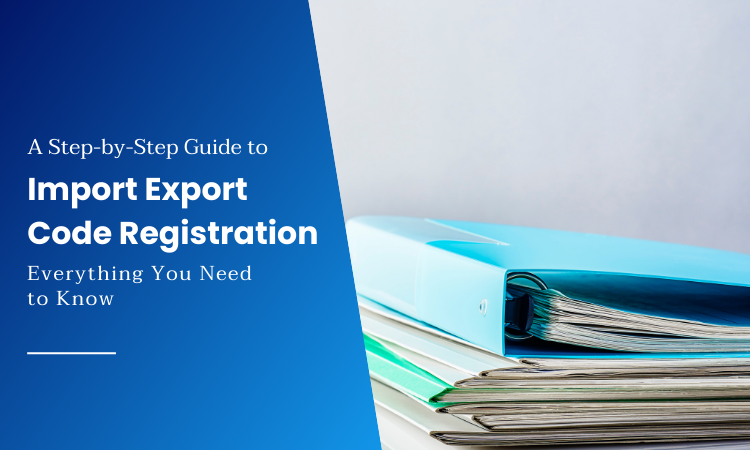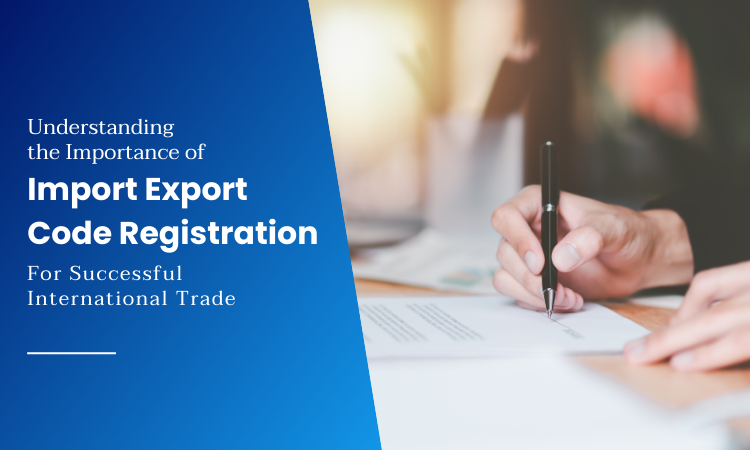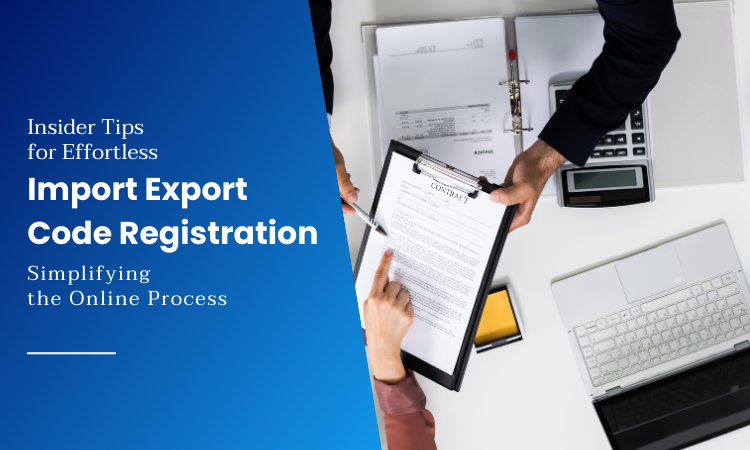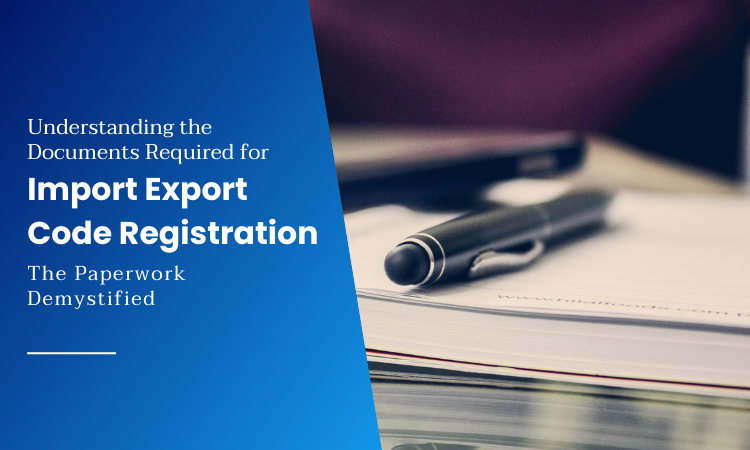Introduction:
In today’s global market, import and export services play a pivotal role in shaping the success of businesses. However, before embarking on international trade ventures, obtaining the essential Import Export Code (IEC) Registration is crucial. This comprehensive guide offers expert insights into the process of IEC code application and online registration, empowering businesses to navigate the intricacies of global trade with confidence and efficiency. So, let’s delve into the world of import-export compliance and unlock boundless growth opportunities.

1. A Step-by-Step Guide to Import Export Code Registration: Everything You Need to Know:
Embarking on the journey of international trade requires meticulous planning, and a crucial step in this process is obtaining an Import Export Code (IEC). This code serves as a unique identifier for businesses engaged in import and export services, facilitating seamless transactions across borders. In this step-by-step guide, we delve into the essential aspects of IEC registration, demystifying the process for a smoother entry into the world of global commerce.
1. Understanding the Importance of IEC:
The key phrase, “import export code registration,” signifies the significance of obtaining an IEC for businesses involved in import and export services. This code is mandatory for international trade, enabling smooth customs clearances and fostering trust among global partners.
2. IEC Code Application Process:
The key phrase, “iec registration online,” highlight the convenience of applying for an IEC code digitally. The process typically involves submitting the required documents, such as PAN card, Aadhar card, and bank details, through an online portal. This streamlined approach expedites the registration process.
3. Document Preparation:
Before initiating the IEC code application, ensure all necessary documents are in order. This includes proof of identity, address, and bank details. A systematic approach to document preparation is essential for a hassle-free registration process.
4. Online Application Submission:
Navigate to the official portal for IEC registration and submit the required information. The online application process simplifies the submission of documents, making it accessible for businesses of all sizes.
5. Verification and Approval:
Once the application is submitted, it undergoes verification by the Directorate General of Foreign Trade (DGFT). Upon successful verification, the IEC code is issued, and businesses are officially authorized to engage in import and export services.

2. Understanding the Importance of Import Export Code Registration for Successful International Trade:
Embarking on the exciting journey of international trade? Buckle up, because navigating the world of imports and exports requires careful preparation. One crucial step in ensuring a smooth and successful operation is obtaining your Import Export Code (IEC). Think of it as your passport to global commerce, opening doors to a world of opportunities.
What is an IEC?
Issued by the Directorate General of Foreign Trade (DGFT) in India, the IEC is a unique 10-digit code that identifies your business as a legitimate player in international trade. It’s mandatory for any entity, individual or organization, seeking to import or export goods or services.
Why is IEC registration important?
Beyond just being mandatory, IEC registration offers several advantages:
- Acts as a business identity: Your IEC code serves as a unique identifier for your trade activities, simplifying communication with customs authorities and foreign partners.
- Facilitates transactions: An IEC is essential for obtaining various licenses and permits required for import and export operations.
- Enhances credibility: Possessing an IEC signifies your commitment to legitimate trade practices, boosting your reputation and fostering trust with international partners.
- Simplifies procedures: With an IEC, you can access online filing facilities for customs clearances, expediting trade processes and saving time.
Ready to register?
The process is relatively straightforward:
- Gather required documents: PAN card, proof of business establishment, bank account details, etc.
- Register online: Visit the DGFT website and complete the online application form.
- Submit documents and fees: Upload scanned copies of required documents and pay the applicable fee.
- Receive your IEC: Once processed, your unique IEC code will be issued and delivered electronically.
Partner with the experts:
Navigating international trade can be complex. Consider seeking assistance from experienced import & export services to ensure a smooth IEC registration process and compliance with regulations. With the right guidance and your IEC in hand, you’re well on your way to conquering the world of international trade!

3. Unlocking Global Opportunities with Import Export Code: How to Apply and Boost Your Business:
The world is your oyster! But to truly dive into the vast ocean of international trade, you’ll need your pearl: the Import Export Code (IEC). This 10-digit magic number, issued by the Directorate General of Foreign Trade (DGFT) in India, unlocks a treasure trove of global opportunities for your business. Let’s explore how to obtain your IEC and leverage it to boost your success.
Why is an IEC Crucial?
Think of your IEC as a business passport. It identifies you as a legitimate player in international trade, opening doors to:
- Market Expansion: Reach new customers beyond domestic borders, tapping into diverse markets and increasing your sales potential.
- Competitive Advantage: Source raw materials or finished goods at competitive prices from abroad, improving your product quality and cost efficiency.
- Diversification: Reduce dependence on the local market by spreading your risk and building resilience through international trade.
- Simplified Processes: Obtain essential licenses and permits, access online filing facilities for customs clearances, and expedite trade procedures.
Applying for Your IEC: A Smooth Sail:
The IEC registration process is relatively straightforward:
- Gather Documents: Prepare your PAN card, proof of business establishment, bank account details, and other required documents.
- Go Online: Visit the DGFT website and navigate to the IEC registration portal.
- Fill the Application: Carefully complete the online form, providing accurate information.
- Upload and Pay: Submit scanned copies of your documents and pay the applicable fee securely through the portal.
- Receive Your IEC: Once processed, your unique IEC code will be delivered electronically.
Boosting Your Business with Your IEC:
With your IEC in hand, it’s time to set sail and explore the exciting world of international trade:
- Partner with Import & Export Services: Leverage their expertise to navigate regulations, find reliable partners, and optimize your logistics.
- Network and Participate in Trade Fairs: Build connections with international buyers and suppliers, showcasing your products and services on a global stage.
- Explore Online Marketplaces: Utilize e-commerce platforms to reach a wider audience and tap into new markets effortlessly.
- Stay Compliant: Regularly update your IEC details and adhere to international trade regulations to ensure smooth operations.

4. Insider Tips for Effortless IEC Registration: Simplifying the Online Process:
The world of international trade beckons, but before you set sail, there’s one crucial step: securing your Import Export Code (IEC). This 10-digit gateway to global opportunities might seem daunting, but fear not! With these insider tips, navigating the online IEC registration process will be a breeze.
Preparation is Key:
- Gather Documents: Before diving online, ensure you have scanned copies of your PAN card, proof of business establishment, bank account details, and any other required documents readily available.
- Choose the Right Category: The DGFT website offers various IEC registration categories. Carefully select the one that best suits your business activity to avoid delays.
- Familiarize Yourself: Take some time to browse the DGFT website and its IEC registration portal. Understanding the process flow beforehand will save you time and frustration.
Streamlining Your Online Journey:
- Double-Check: Meticulously review all information entered in the online application form. Typos or inconsistencies can lead to processing delays.
- Upload Wisely: Ensure all scanned documents are clear, legible, and in the specified format to avoid rejections.
- Payment Prowess: Double-confirm payment details before submitting your application. Technical glitches can occur, so having a backup payment method handy is helpful.
Proactive Problem-Solving:
- Bookmark and Save: Keep the application reference number and website link handy for easy tracking of your application status.
- Technical Hiccups: If you encounter technical issues, don’t hesitate to contact the DGFT helpdesk or seek assistance from experienced import & export services.
- Stay Informed: Keep yourself updated on any changes in IEC registration procedures or document requirements. The DGFT website is your go-to resource.
Bonus Tips:
- Accuracy is Paramount: Providing accurate and complete information throughout the process is crucial for a smooth and efficient registration.
- Seek Expert Help: If you’re unsure about any aspect, don’t hesitate to consult import & export service providers for professional guidance.
- Stay Patient: While the IEC registration process is generally swift, it can sometimes take longer. Be patient and follow up as needed.
5. Common Pitfalls to Avoid When Applying for Import Export Code Registration:
The Import Export Code (IEC) is your passport to the world of international trade in India. Obtaining it online might seem straightforward, but pitfalls lurk around the corner, potentially delaying your journey. Let’s navigate these roadblocks and ensure a smooth IEC registration process:
1. Inaccurate or Incomplete Information: Double-check every detail you enter in the online application form. Typos, inconsistencies, or missing information can lead to rejections and processing delays.
2. Incorrect Document Selection: The DGFT website offers various IEC categories. Choosing the wrong one based on your business activity can cause complications and require resubmission.
3. Scanned Document Woes: Ensure all scanned documents are clear, legible, and in the specified format. Blurry images or incorrect formats can lead to rejections, wasting valuable time.
4. Payment Mishaps: Technical glitches happen. Have a backup payment method ready in case online payment fails during submission. Double-check payment details before finalizing.
5. Forgetting: Bookmark the application reference number and website link for easy tracking. Delays can occur, so follow up periodically if your IEC hasn’t arrived within the expected timeframe.
6. Ignoring Regulation Updates: IEC registration procedures and document requirements can change. Stay updated by regularly checking the DGFT website to avoid unnecessary hurdles.
7. Going Solo When Unsure: Don’t be afraid to seek help! If you’re unsure about any aspect of the process, consider consulting experienced import & export service providers. Their expertise can save you time and ensure a smooth registration.
8. Rushing the Process: While speed is desirable, prioritize accuracy. Rushing through the application or submitting incomplete documents can lead to rejections and delays, ultimately taking longer than a careful approach.
9. Neglecting Professional Guidance: Complexities can arise, especially for first-time applicants. Consider partnering with import & export services for tailored assistance. They can navigate regulations, ensure compliance, and handle technical issues, saving you time and stress.
10. Ignoring Security: Online transactions require vigilance. Protect your data by using secure internet connections and avoiding public Wi-Fi while submitting your application and making payments.

6. Maximizing Your Business Potential with Import Export Code Registration:
The world is your oyster! But to truly dive into the vast ocean of international trade, you need your pearl: the Import Export Code (IEC). This 10-digit magic number, issued by the Directorate General of Foreign Trade (DGFT) in India, unlocks a treasure trove of global opportunities for your business. Let’s explore how obtaining and utilizing your IEC can propel your business to new heights.
Beyond Compliance: A Gateway to Growth:
While IEC registration is mandatory for import and export activities, it’s much more than just a legal requirement. It’s a strategic move that can:
- Expand Your Market Reach: Access new customers and markets internationally, diversifying your revenue streams and mitigating regional economic risks.
- Source Advantageously: Import raw materials or finished goods at competitive prices, improving product quality and cost efficiency.
- Boost Brand Recognition: Participate in international trade fairs and online marketplaces, showcasing your products and services to a global audience.
- Build Strategic Partnerships: Collaborate with international suppliers, distributors, and other businesses, fostering innovation and growth.
- Stay Ahead of the Curve: Gain access to global trends and expertise, ensuring your business remains competitive in the ever-evolving marketplace.
Unlocking the Full Potential:
Obtaining your IEC is just the first step. To truly maximize its benefits, consider these additional strategies:
- Leverage Import & Export Services: Partner with experienced professionals to navigate complex regulations, identify ideal partners, and optimize logistics.
- Stay Updated on Trade Policies: Regularly monitor DGFT updates and international trade agreements to capitalize on emerging opportunities.
- Embrace Continuous Learning: Invest in industry knowledge and cultural awareness to build strong relationships with international partners.
- Prioritize Quality and Compliance: Maintain high product and service standards, adhering to international regulations to build trust and credibility.

7. The Paperwork Demystified: Understanding the Documents Required for Import Export Code Registration:
The Import Export Code (IEC) unlocks a world of international trade potential for Indian businesses. But before you embark on this exciting journey, navigating the required documents can seem like a bureaucratic maze. Fear not, intrepid entrepreneur! This guide will demystify the paperwork, ensuring a smooth IEC registration process.
Essential Documents for Every Applicant:
1. PAN Card: Your business PAN card serves as proof of identity and registration.
2. Proof of Business Establishment: Depending on your business structure, this could be:
- Proprietorship: Aadhaar card or passport copy of the proprietor.
- Partnership: Partnership deed or registration certificate.
- Company: Certificate of Incorporation and Memorandum of Association.
- HUF: HUF registration certificate.
3. Proof of Business Address: A copy of your rent agreement, electricity bill, or other document verifying your business address.
4. Bank Account Details: Cancelled cheque from your business bank account displaying account name, account number, and bank branch details.
Additional Documents for Specific Cases:
1. For foreign nationals or NRIs: Passport copy and address proof in India.
2. For individuals acting as Karta for HUF: Karta’s PAN card and address proof.
3. For additional partners/directors: Individual details and proof of address for each partner/director.
Remember:
1. All documents must be clear, legible copies.
2. Scan them in the specified format (usually PDF) before uploading.
3. Double-check for accuracy and completeness before submitting your application.
Seeking Expert Help:
The process might seem daunting, especially for first-time applicants. Consider partnering with experienced import & export service providers. They can:
1. Verify document requirements based on your specific business setup.
2. Assist with document preparation and scanning.
3. Ensure accuracy and completeness to avoid delays.
8. IEC Code vs. Other Licenses: Why Import Export Code Registration Should Be Your Priority:
Embarking on the exciting journey of international trade? You’ll likely encounter a sea of acronyms and licenses, leaving you wondering which ones are truly essential. While specific permits and licenses might be required depending on your industry or products, the Import Export Code (IEC) reigns supreme as the foundation for any import or export activity in India. Let’s explore why securing your IEC should be your top priority:
The Gateway to Global Trade:
The IEC, issued by the Directorate General of Foreign Trade (DGFT), acts as your business passport to the world. It’s a mandatory 10-digit code that unlocks a plethora of opportunities:
- Import and Export Goods and Services: Without an IEC, you simply cannot engage in any cross-border trade activities.
- Obtain Essential Licenses and Permits: The IEC serves as a prerequisite for acquiring various industry-specific licenses and permits crucial for your operations.
- Benefit from Trade Schemes and Incentives: Government trade schemes and incentives often require a valid IEC for participation.
- Simplify Customs Clearance: An IEC facilitates smoother customs clearances, saving you time and resources.
Beyond Legality, Building Credibility:
Possessing an IEC goes beyond mere legal compliance. It signifies your commitment to legitimate trade practices, enhancing your credibility and reputation in the eyes of:
- International Partners: Potential suppliers, distributors, and buyers view an IEC as a mark of seriousness and professionalism.
- Financial Institutions: Banks require an IEC for processing various trade-related transactions, including opening letters of credit.
- Customs Authorities: An IEC simplifies interactions with customs departments, fostering trust and cooperation.
IEC vs. Other Licenses: Key Differences:
While other licenses might be necessary for specific products or activities, remember:
- Universality: The IEC applies to all import and export operations, unlike product-specific licenses.
- Foundation First: Securing your IEC is the first step before applying for most other trade-related licenses and permits.
- Streamlined Process: Obtaining an IEC is generally a faster and simpler process compared to some industry-specific licenses.
Partnering for Success:
Navigating the world of international trade can be complex. Consider seeking guidance from experienced import & export services. They can assist with:
- IEC registration: Ensuring a smooth and hassle-free application process.
- License identification: Helping you determine any additional licenses required for your specific business activities.
- Compliance guidance: Keeping you updated on regulations and ensuring adherence to them.
9. Expert Insights: How Import Export Code Registration Can Accelerate Your Business Growth:
Thinking about taking your business international? The possibilities are endless, but before you set sail, there’s one crucial step – securing your Import Export Code (IEC). This 10-digit magic number, issued by the Directorate General of Foreign Trade (DGFT), is more than just a legal necessity; it’s a key that unlocks a treasure trove of opportunities for growth. Let’s delve deeper with insights from import & export service experts:
From Local Hero to Global Leader:
“Access to new customer categories and markets is made possible by the IEC,” explains Ms. Malhotra, a seasoned import & export service professional. “Imagine accessing a wider audience, diversifying your revenue streams, and mitigating dependence on local market fluctuations. That’s the power of international trade!”
Beyond Borders, Beyond Boundaries:
“Obtaining finished goods or raw materials at competitive global pricing can greatly increase the cost-effectiveness and quality of your output,” highlights Mr. Patel, another import & export service expert. “With an IEC, you can unlock a world of suppliers and negotiate better deals, boosting your bottom line.”
More Than Just Transactions:
“Creating strategic alliances with global companies can spur innovation and expansion,” emphasizes Ms. Sharma, an import & export service consultant. “The IEC facilitates participation in trade fairs and online marketplaces, connecting you with potential partners and collaborators worldwide.”
Navigating the Maze with Confidence:
The process of obtaining an IEC might seem daunting, but experts agree: “Don’t go it alone!” Partnering with experienced import & export service providers can:
- Streamline the registration process: Ensure accuracy and completeness, avoiding delays.
- Identify additional licenses: Help you determine any industry-specific requirements.
- Stay compliant: Keep you updated on regulations and ensure smooth operations.
10. Navigating International Trade Compliance: How Import Export Code Registration Ensures Legitimate Business Operations:
The allure of international trade beckons – new markets, diverse customers, and exciting growth opportunities. But venturing across borders comes with its own set of rules and regulations. Ensuring compliance with these can seem like a daunting task. Fear not, aspiring importers and exporters! The Import Export Code (IEC) serves as your key to navigating the world of international trade compliance with confidence.
IEC: Your Passport to Legitimate Trade:
Issued by the Directorate General of Foreign Trade (DGFT), the IEC is your mandatory 10-digit identification code. It signifies your commitment to legitimate trade practices and adherence to Indian trade regulations. Think of it as your business passport, granting access to:
- Essential Licenses and Permits: Many licenses and permits required for specific imports and exports necessitate a valid IEC.
- Simplified Customs Clearance: An IEC facilitates smoother customs procedures, saving you time and resources.
- Government Trade Schemes and Incentives: Several government initiatives supporting international trade often require an IEC for participation.
Beyond Legality, Building Trust:
Possessing an IEC transcends mere legal compliance. It demonstrates your dedication to ethical trade practices, enhancing your reputation and credibility with:
- International Partners: Buyers, suppliers, and collaborators view an IEC as a mark of professionalism and responsible business conduct.
- Financial Institutions: Banks require an IEC for processing trade-related transactions, fostering trust and facilitating your financial operations.
- Customs Authorities: A valid IEC promotes smoother interactions with customs departments, streamlining your import and export activities.
Staying Compliant: Avoiding the Pitfalls:
Navigating the complexities of international trade regulations can be challenging. Non-compliance can lead to delays, fines, and even legal repercussions. An IEC helps mitigate these risks by:
- Serving as a Regulatory Gateway: Possessing an IEC demonstrates your awareness of legal requirements and commitment to complying with them.
- Facilitating Transparency: The DGFT maintains an online database of registered IEC holders, ensuring transparency and accountability within the trade ecosystem.
- Empowering Informed Decision-Making: Understanding your IEC obligations promotes responsible sourcing, ethical labor practices, and adherence to environmental regulations.
Partnering for Success:
Seeking guidance from experienced import & export service providers can be invaluable in ensuring compliance and maximizing your IEC’s benefits. They can assist with:
- IEC registration: Ensuring a hassle-free and accurate application process.
- Staying updated: Keeping you informed on evolving regulations and best practices.
- Identifying additional licenses: Helping you determine any industry-specific compliance requirements.
Conclusion:
Obtaining an Import Export Code (IEC) registration is essential for businesses looking to engage in import and export services. By following the steps outlined in this complete guide, including the online application process for IEC code registration, you can ensure compliance and unlock a world of international trade opportunities. Don’t miss out on the chance to expand your business globally – get your IEC registration today!
